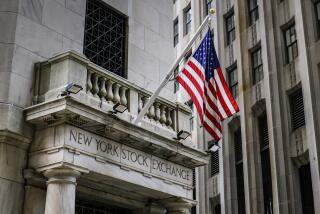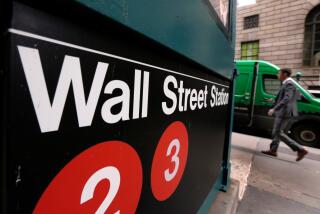ASIA WATCH
- Share via
* S&P; FORECAST: Emerging European economies are not expected to suffer the effects of Asia’s financial crisis this year, because they do little trade with countries in the region, analysts at Standard & Poor’s Corp. said. Weakening currencies across the region--Indonesia’s rupiah is down 66% this year alone--hurt other countries’ export industries as Asian companies sell their goods at cheaper prices. This isn’t likely to affect Central and Eastern European countries, because their “trade exposure to Asian companies is not enough to have a significant impact,” said George Dallas, S&P; managing director for Eastern Europe, the Middle East and Africa. “The increased competitiveness will not have a great impact at least in the near term.” S&P; is taking “cautious comfort” in the creditworthiness of emerging Europe because companies there have less debt than their counterparts in Asia and are not at risk of losing lenders’ confidence.
*
* PESO PROBLEMS: Mexican stocks tumbled for a third day amid concern that a flood of Asia exports will crimp Mexican sales abroad and a weaker peso hurt the dollar value of stocks. “Asia’s problems are having a negative effect, particularly on certain export industries,” said Guillermo Stain, who manages about $200 million in fixed-income and equities at Ixe Casa de Bolsa. “The outlook for stocks in the short term is difficult.” Mexico City’s Bolsa index, led lower by exporters, fell 1.47%. Shares of Mexico’s top exporters led the retreat. Chemical and auto parts maker Desc fell 6% and leading steelmaker Altos Hornos de Mexico dropped 5.1%.
*
* METAL BUST: London Metal Exchange trading will fall this year in part because of a slump in demand from Asia, where economies are slowing, the exchange’s chief executive, David King, told Bloomberg News. After a 20% surge in trading last year, the world’s largest metals exchange made changes to its budget to prepare for a decline in activity, King said during a visit to Chicago with other exchange officials. He declined to provide specifics. “If we’re coming to a phase of an economic downturn, because of repercussions of the Southeast Asian economies, the use of the markets will change, the use of our warehouses will change,” King said. Japan is the second-largest consumer of copper behind the U.S., and the largest Asian consumer. Weaker currencies and rising debts are making it more expensive to import raw materials.
*
* THAI DONORS: Thailand’s army appealed to citizens to donate their gold to the depleted national treasury, saying it will hold a telethon for gifts of gold jewelry and gold bars. “If Thais will not help Thais first, there will not be anyone to help us. And the army will help the government wholeheartedly to solve the country’s economic problems,” army commander Gen. Chetta Thanajoro said in Bangkok. The telethon on Sunday, the nation’s Army Day, will kick off a weeklong military fund-raiser to bolster the nation’s foreign reserves, drained by the economic crisis sweeping Asia. The appeal immediately brought in 45.36 pounds of gold. Earlier this month, thousands of Thais responded to a Buddhist monk’s appeal to exchange their dollars and other foreign currency with the treasury, receiving in return the battered baht, the Thai currency.
*
* INVESTOR UNREST: Hundreds of angry investors marched to the offices of Hong Kong leader Tung Chee-hwa to demand help in recovering money lost when a Hong Kong finance house failed, Hong Kong radio said. Led by politicians from Hong Kong’s Democratic Party, the nearly 300 investors said the brokerage C.A. Pacific Finance was heartless and misled them about their investments with the firm. Tung accepted a petition from the investors and said that although the government will try to help, it will not bail out investors. Hundreds of other investors also flocked to their brokerages, fearing a series of collapses following the failure of C.A. Pacific on Monday and that of another investment house, Peregrine Investment Holdings Ltd., earlier this month. Hong Kong’s Securities and Futures Commission, the stock market regulator, said it has put up to 18 small brokerages on a “watch” list.
More to Read
Inside the business of entertainment
The Wide Shot brings you news, analysis and insights on everything from streaming wars to production — and what it all means for the future.
You may occasionally receive promotional content from the Los Angeles Times.










